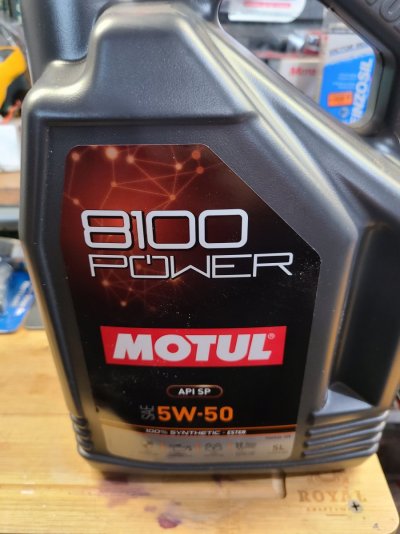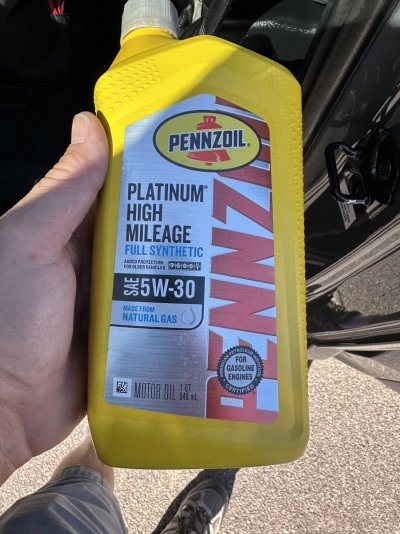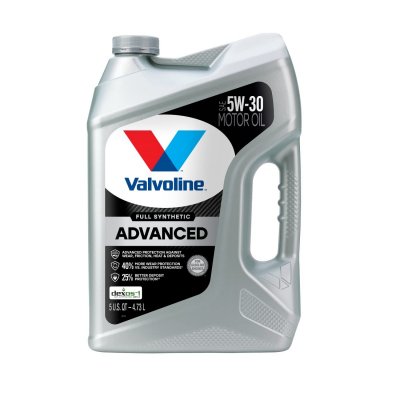0W-30 is only recommended for use where the ambient temperature is -22 F or below.I run 5w-30, but anyone here outside of @Space Ghost run 0w-30?
- Forums
- GEN 2 (2017-2020) Ford F-150 Raptor Forums
- Ford Raptor Engine Discussion and Performance Mods
You are using an out of date browser. It may not display this or other websites correctly.
You should upgrade or use an alternative browser.
You should upgrade or use an alternative browser.
GEN 2 Ford GT oil in a Raptor
- Thread starter johnmh
- Start date
Disclaimer: Links on this page pointing to Amazon, eBay and other sites may include affiliate code. If you click them and make a purchase, we may earn a small commission.
Old-Raptor-guy
FRF Addict
Man the subject that never dies. I have posted quite a few times on this subject and if I get a chance I will link to some of those.
I hate to repeat myself so to speak.
(Doing this post on my phone, PC much easier for me to find other posts and link).
After the last "blow up" over oil I did come to a couple conclusions.
1: everyone has there own opinions. If you believe what you are doing is working for you then it is near impossible for me to convince you otherwise. (Think of a catholic a Jewish person and a Muslim all talking about God, ain't no one leaving that conversation believing someone else is right)
2: change your oil, change your oil, change your oil. I don't think Brand is a driving factor. (I do have my opinions on weight we will get to that).
I don't understand the drive/push for super extended oil change intervals. 5000k MAX. Oil is cheap insurance.
At my shop we are replacing an 2.7 ecoboost engine (local quick lube ****** oil change up) end bill is little over $19,000.
Saving $100 a year on oil only to have engine die an early death makes no sense. You are not saving the planet, ask yourself how many/much resources are used to produce/ship/replace an engine or junk the entire vehicle and replace with new one?
This goes for your transmission as well (life time lube my ass).
You have to understand when you read then owners manual it is for "normal usage" most never read the "severe duty" maintenance guide. I promise 80% of people fall into the severe usage. Hot weather (above 90) cold weather (below 40) dusty, stop and go driving, short trips, towing and a couple other things all put you into severe usage.
I run a 5w40, diesel oil.
The first number is the rating for how the oil flows (viscosity, thickness what ever term works in your head) cold. Some say freezing (32 F) some say 0F. Either way 5w will flow faster than 10W or 15w.
I would never recommend a rating higher than 5 (not sure why GM and Ram still suggest 15W40 for their diesels (well I do but dumb reason, will see if I can touch on that)
There are a few youtube videos about cold oil flow. But for me you want oil to all moving parts ASAP.
Years ago when multi weight oil began to hit the main stream (yep I am oid) and became the suggested oil by the manufacturer Ford did a " little experiment".
They took 3 7.5L (460cid) engines, one filled with 5w30, one 10w30 and one 15w40. All three started and ran without one valve cover, at I believe 32F temp. 5w engine had oil to rocker arms in about 15 sec, 10w was around 25sec (is has been 35 years my memory might be off a couple seconds) the 15w was over 2 minutes(that part I remember)
The second number is the flow ability of the oil at normal engine operating temp (figure 200 degrees).
As far as the crank, rods and cam journals are concerned oil doesn't actually "lubricate" like you think.
The crankshaft floats or "hydroplanes" on a film of oil .002 inches thick (spec is .0012 - .0029). At the moment a cylinder fires the crankshaft is pushed down, the oil must catch the crankshaft (oil will be squeezed out) before it touches the bearing (which is a soft metal that can take the impact better than the harder crankshaft metal). So the oil must be "thick" enough that it doesn't just squeeze out with no resistance
(Think, would you rather belly flop into a full swimming pool or an empty one).
The oil must also be thin enough to flow into the cavity fast enough to make sure there is oil ready for the next cycle.
The same happens on the connecting rod, the rod is pushed down with much more force than when the piston travels up. This is why when an engine is torn down the upper rod bearings and the lower main bearings are always worn the most.
The cam is the same except it is fighting spring pressure instead of piston/combustion forces.
For me and what I see daily 30 weight just doesn't protect as well. 20 weight is my actual nemesis as I see more engine problems since that oil was introduced than the previous years (right now that would be basically 20 years of evidence before 5w20 and 20 years after).
Looking up oil clearance specs the GT engine is quite a bit looser with about 50% more clearance. (It also has an almost 14qt dry sump system). So for me 50 weight might be a little much, unless I was in AZ and pushing my Raptor hard (which I do for sure).
Lastly correctly labeled diesel oil (real diesel oil can't meet gas engine specs, and it is becauseof the zinc allowed) has more zinc. Google it, do your own research, but it is a very well known and understood antiwear additive.
There are some pretty smart people here that know more than me as far as the chemistry goes, all my evidence is about 40 years worth of real world experience.
Chrysler does recommend 0w40 for their hemi's. They are trying to prevent camshaft issues I believe, so the 0w is to get oil flowing as fast as possible. I think it would be a little over kill unless in extreme northern USA, Canada or Alaska (yes I know Alaska is part of USA, you know what I mean)
As our engines are not known for any particular oil related failures (hemis are known for cam shaft issues)
I would rather have the extra zinc.
Lastly, I tend to own my vehicles for decades, so long term reliability is my ultimate goal. If you have owned multiple Raptors then most of this is wasted on you, as minimum maintenance can easily get a vehicle to last 5 years
(I will come back and clean this post up or add stuff if needed)
Last edited:
Old-Raptor-guy
FRF Addict
Oh the reason 15w-40 is recommended for diesels (not ford diesels anymore).
15w40 is a 25 point spread, that is the highest spread you can have in a conventional oil. Back in the 90's there was a 10w-40 conventional for about 3 years. It was figured out that it degraded rather quickly and did not work out and was pulled from the shelf (discontinued probably a better word)
So 15w40 is cheaper. Also diesels are somewhat expected to be started and then ran hard for long time which the 40 helps with heat/protection. Diesels aren't ment for short trips. They are ment to work. So the cold flow is minor issue if the engine is started and ran for hours.
Ford recommends 10w30 (normal usage) or 5w40 (severe usage which we already discussed is 80% of owners) on their diesels, I think they know how customers actually use them these days vs 30 years ago.
15w40 is a 25 point spread, that is the highest spread you can have in a conventional oil. Back in the 90's there was a 10w-40 conventional for about 3 years. It was figured out that it degraded rather quickly and did not work out and was pulled from the shelf (discontinued probably a better word)
So 15w40 is cheaper. Also diesels are somewhat expected to be started and then ran hard for long time which the 40 helps with heat/protection. Diesels aren't ment for short trips. They are ment to work. So the cold flow is minor issue if the engine is started and ran for hours.
Ford recommends 10w30 (normal usage) or 5w40 (severe usage which we already discussed is 80% of owners) on their diesels, I think they know how customers actually use them these days vs 30 years ago.
1BAD454SSv2
FRF Addict
OK on my way to H.E.L.L . OH THE HUMANNITY . Changed oil this morning at 4am in Arizona . If I try to do a few hours after sun up. I would be a Crispy Chimichanga laying in the driveway. 5w50 motul 8100 went in 6 _1/2 quarts. Previous was 5w40 motul 8100 . Did a flood start engine prime. Started up whisper quiet as usual . Pressure up a tad from a few weeks ago before change 32.6psi at 179 oil temp. New oil 32.8 psi at 187 oil temp . Let things warm up to normal . Got on to interstate full throttle till 100 then cruised at 90 good 10 miles . Nobody out here at 7 am on a Sunday. Pressure change is negligible. We will see after work it's supposed to 117 this afternoon . Flame away
Attachments
Last edited:
downforce137
FRF Addict
OK on my way to H.E.L.L . OH THE HUMANNITY . Changed oil this morning at 4am in Arizona . If I try to do a few hours after sun up. I would be a Krispy Chimichanga in the driveway. 5w50 motul 8100 went in 6 _1/2 quarts. Previous was 5w40 motul 8100 . Did a flood start engine prime. Started up whisper quiet as usual . Pressure up a tad from a few weeks ago before change 32.6psi at 179 oil temp. New oil 32.8 psi at 197 oil temp . Let things warm up to normal . Got on to interstate full throttle till 100 then cruised at 90 good 10 miles . Nobody out here at 7 am on a Sunday. Pressure change is negligible. We will see after work it's supposed to 117 this afternoon . Flame away
i think 5w50 is also the way to go, even in not so extreme climates.. if your daily driving and not putting some hard miles on im sure 5w30 will suffice..
As oil gets thicker ring pack needs to be able to scrape. Does the raptor have low tension or high tension rings?
Old-Raptor-guy
FRF Addict
I don't think any modern engine has high tension rings.As oil gets thicker ring pack needs to be able to scrape. Does the raptor have low tension or high tension rings?
Raptornador
Member
Similar threads
- Replies
- 0
- Views
- 1K
Members online
- PK37
- Badboy4fun_wa
- heeeyyy123
- Thunder Piggy
- dillard09
- Pyro3601
- killallblue
- Barr993
- WH7
- ograptor
- slade8
- DDD2019
- texasvolfan
- HORN HIGH ACES
- nealhoney
- BKRAPTOR
- scottybs
- CSP
- RamseyF
- gdflynn1
- ActionJaxon
- The Car Stereo Company
- HOLLYWOOD 1
- Rybread
- tabvette
- raptortrav001
- Muchmore
- scg149
- Kpr1
- NightshadeRaptor
- k9ltd3
- CVF-Jason
- raptor_fredo
- stevenstommyboy1
- brettmess24
- taquitos
- Sage
- FossilFuel
- Ken4570
- Relentles0ne
- bunkisland
- kbexit
- Old-Raptor-guy
- 91Eunos
- dj30417
- TomDirt
- UtzPotatoChip13
- aak274
- Geforce
- Goose8651
Total: 2,760 (members: 72, guests: 2,688)








